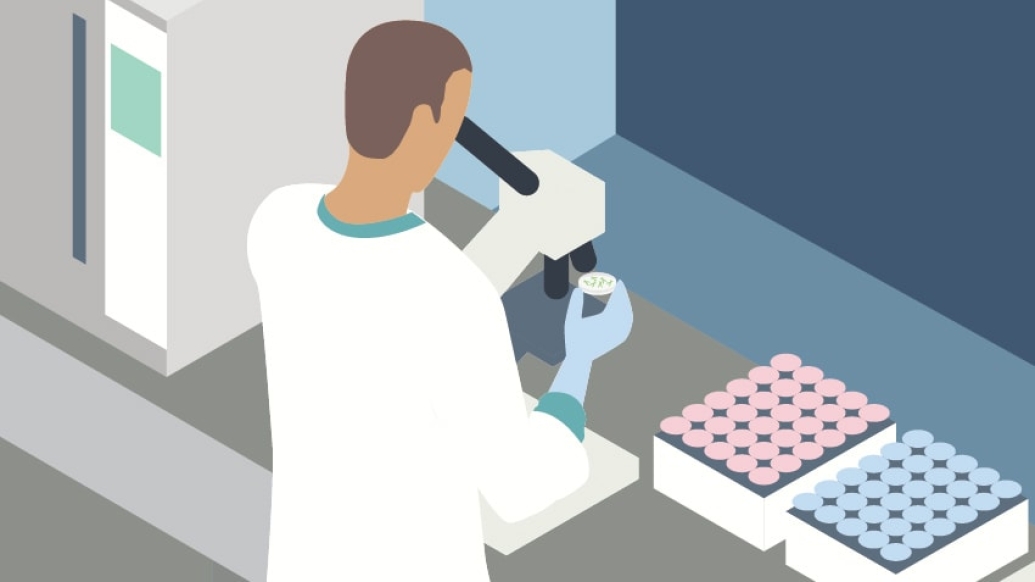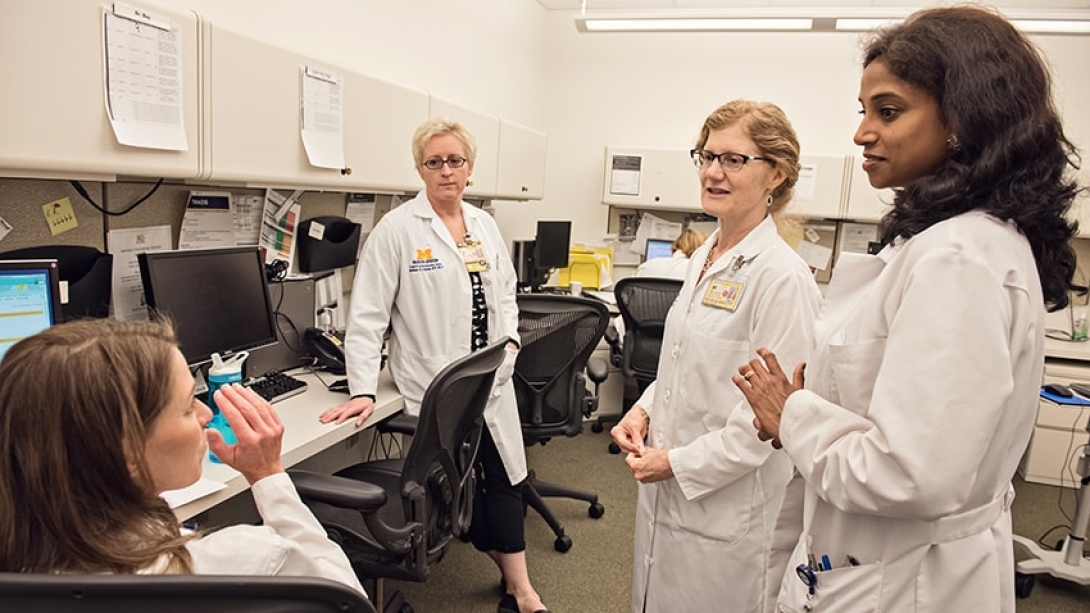Genetic testing, when appropriate, is a powerful tool to gauge a patient’s risk for disease. A Michigan Medicine genetic counselor explains the process.
7:00 AM
Author |

On the surface, the concept seems like a no-brainer: A sample of blood or saliva can offer clues to your body's genetic defects, a road map to predicting future problems ranging from Alzheimer's disease to cancer.
MORE FROM MICHIGAN: Sign up for our weekly newsletter
But put into practice, genetic testing is more nuanced.
The results, after all, might not be what patients want to hear — especially because they could reveal an inherited mutation that puts themselves or their kids at risk. And since each parent contributes 50 percent to a child's DNA, two siblings may have different test results.
"The science is easy to process; the emotional component is not," says Rajani Aatre, M.S., M.Sc., a genetic counselor at the University of Michigan Frankel Cardiovascular Center.
"Let's say you find out your kid got something because you passed it down. No matter how much you intellectualize it, you can't ever discount that the feeling of responsibility or guilt won't affect you."
Still, she says, there is power in knowledge: It allows recipients to be proactive about their own health — and to help determine if other family members are at risk.
And as awareness of genetic mutations grows, testing mechanisms have become quicker, cheaper and more precise.
"It's just exploded," says Aatre. "The kind of tests we have today weren't even possible 20 years ago."
But the decision to get a test, she notes, shouldn't be made lightly. It's why most people first need a recommendation from their primary care physician.
They'll also meet with a certified genetic counselor to explain the process and the many considerations that come with getting the detailed analysis.
"Most people, once they've understood that, want to do it," says Aatre, who explained some of the pros and cons of genetic testing she discusses with patients:
Pros of genetic testing
It offers insight: With genetic testing, "we're targeting the coding part of the gene that is relevant to your particular disease," Aatre says. That, she notes, involves reading a DNA sequence from start to finish to see if there are any "interruptions/disruptions" — mutations associated with the disease in question — that stop the gene from making normal proteins.
Uncertainty is lessened: Worried about a future ailment? Knowing that a particular mutation is absent can help people ease anxiety about their own health and that of their children. "A big part of genetic testing is trying to determine who else in the family is at risk," Aatre says. "But you're also providing reassurance."
SEE ALSO: Collecting a Family's Cancer History: What You Should Ask
You can take action: A clearer portrait of risk can guide medical care. "Certain genes are associated with more severe diseases," Aatre says. "Some genes respond to certain medications and treatments better." That, depending on circumstance, might lead to additional diagnostic testing or monitoring, healthful lifestyle shifts or getting family members tested.
Discrimination is (mostly) protected: Genetic testing results will appear on your medical record. That's why several anti-discrimination laws protect recipients, notably the Genetic Information Nondiscrimination Act of 2008, which prohibits employers using that data to hire, fire or promote and health insurance companies from using it as a pre-existing condition. Notable exceptions: Disability, life and long-term care insurance could be affected.

Cons of genetic testing
Not everyone is eligible: To get tested, a loved one must already have been affected by a disease or disorder — and been genetically tested, too. The reason? "You need to know what to go after," Aatre says. Everyone's body has seven to 10 nonworking/altered genes, she notes, so family and clinical history must dictate when and where to focus attention (and avoid unnecessary anxiety).
SEE ALSO: Should Young People Get a Colon Cancer Screening? It Depends on Their Risk
It isn't a full-body review: Testing is targeted: "When someone walks in my door, I'm not going to screen them for everything on the planet," Aatre says. "Without clear markers, you're opening Pandora's box." A patient whose parent was tested for a genetic heart condition, for example, wouldn't be a candidate for BRCA 1 or 2 testing to determine breast cancer risk.
Testing can be costly: The price of genetic testing ranges from a few hundred dollars to several thousand dollars. "They're cheaper than they used to be but are still very expensive," Aatre says. Still, insurance typically covers such tests for newborns and expectant mothers, as well as patients with a documented personal or family history or a physician's recommendation.
Results may trigger emotions: Finding out that a gene mutation is absent can offer a deep sense of relief. And others who find out that they are carriers can take comfort in having more control. Still, says Aatre: "This crystal ball, all of a sudden, can pop in front of you." That may spark deep feelings of guilt (regardless of findings) or difficult decisions.
For more information or to make an appointment for genetic counseling or testing at the Frankel Cardiovascular Center, call 888-287-1082.

Explore a variety of health care news & stories by visiting the Health Lab home page for more articles.

Department of Communication at Michigan Medicine
Want top health & research news weekly? Sign up for Health Lab’s newsletters today!





